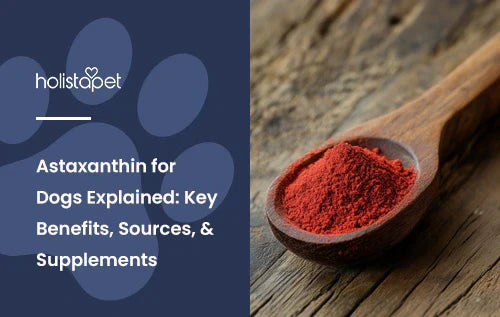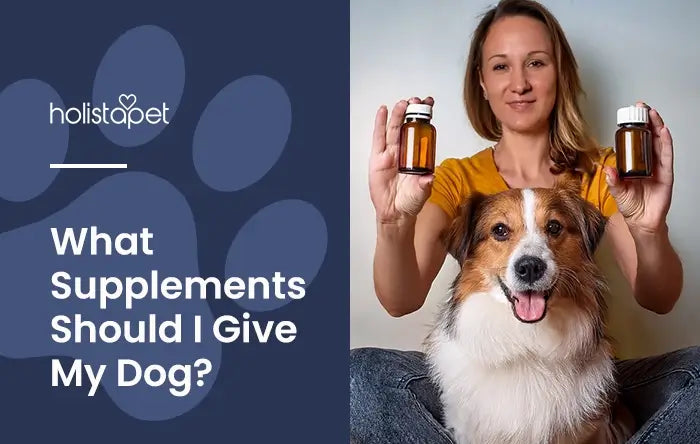Do you ever wonder what gives salmon its vibrant pink color? That same pigment may help support your pup' health. We're talking about astaxanthin for dogs! This powerful antioxidant, often found in seafood, provides a wealth of health benefits for our canine friends.
With its remarkable antioxidant properties, astaxanthin supports the immune system, healthy joints, and overall well-being. In this article, we'll explore its key benefits, sources, and supplement options. Read on to discover how this mighty ingredient helps create happy and healthy dogs at every life stage.
What Is Astaxanthin?

Astaxanthin is a type of carotenoid. It is a natural pigment found in marine life, such as salmon, trout, krill, and algae. Unlike some other antioxidants, astaxanthin is famous for its superior ability to neutralize free radicals. Free radicals are unstable molecules that can cause cell damage, aging, and chronic disease.
This compound is specifically helpful in fighting oxidative stress, a common issue in aging dogs. Oxidative stress happens when there is an imbalance between free radicals and antioxidants in a dog's system. All that said, astaxanthin is a beneficial ingredient for optimal canine wellness.
Astaxanthin Is a Powerful Antioxidant
Astaxanthin is much more powerful than many other antioxidants. It's believed to provide superior protection against free radical damage. Free radicals are like rust that slowly wears down your dog's health. Astaxanthin acts as a robust shield to keep free radicals at bay.
It is also unique because it supports dogs' entire cell health. It doesn't just include the parts that are water-loving or fat-loving. This means it can fight oxidative stress in a more comprehensive way.
What Is Oxidative Stress in Dogs?
Oxidative stress might sound complex, but it's really simple. It occurs when a dog's system has an excessive number of free radicals and insufficient antioxidants. This imbalance can affect their entire body, from the brain to the tail.
Imagine your dog's body like a city where antioxidants are the police, keeping free radicals—the troublemakers—under control. Without enough police around, the troublemakers can cause chaos. For your dog, this can mean a weaker immune response, poor skin, and more.
That's why powerful antioxidants like astaxanthin are so vital. They help keep everything in order and your dog feeling great.
Is Astaxanthin Safe for Dogs?
Yes, astaxanthin is generally safe for dogs when administered properly. This natural compound comes from algae and marine creatures, which are part of many wild animal diets.
Studies in veterinary medicine have shown that astaxanthin can help fill nutritional gaps in a dog's diet without adverse side effects. Of course, it's always best to consult your vet before starting any new supplement.
What Are the Benefits of Astaxanthin for Dogs?
No doubt, astaxanthin for dogs offers a wide range of health benefits for our canine pals. We'll discuss each benefit more later, but below is a brief overview of what astaxanthin can do for your dog:
- Supports the Immune System
- Supports Heart Health
- May Promote Joint Health
- May Aid in Exercise Recovery
- Promotes Healthy Skin and Coat
- May Assist Brain Function
- May Support Vision Health
Supports the Immune System
Astaxanthin potentially supports immunity by increasing the activity of immune cells. A strong immune response makes it easier for your dog's body to fight pathogens and illnesses, regardless of age.
Healthy levels of this compound may support a strong defense against common bacterial and viral infections. It's like your dog has an extra layer of protection to stay strong and vibrant throughout their life.
Supports Heart Health
Astaxanthin may help reduce oxidative stress and swelling, two major contributors to heart problems. It may help shield the heart and blood vessels from oxidative damage, promoting a robust cardiovascular system.
This powerful antioxidant may also help promote blood flow and regulation of blood pressure, which also supports heart health. A good heart function provides stable energy levels and stamina in pets. Whether your dog is a lively puppy or a senior in their golden years, astaxanthin may benefit heart health.
May Promote Joint Health
Astaxanthin can support aging dogs and large breeds prone to joint issues. This antioxidant promotes joint health by helping reduce swelling. With less swelling, dogs will feel less discomfort and have better mobility.
Dogs with mobility issues or joint aches after exercise can take astaxanthin to help maintain their active lifestyle. It's like having a maintenance team for their joints that makes it easier for them to run, jump, and play without discomfort.
Aids in Exercise Recovery
Astaxanthin helps reduce muscle damage and swelling that typically happens after intense activity. This potent antioxidant supports recovery and allows canines to maintain their energy levels. With enough astaxanthin, dogs are always ready for the next play session.
The natural compound can also help increase endurance and strength. It may enable dogs to enjoy their physical activities for longer without quickly getting tired. This helps highly active dogs or dogs in training the most.
Promotes Healthy Skin and Coat
Like vitamin E, astaxanthin for dogs may help improve skin and coat conditions. The carotenoid helps strengthen the skin's barrier and reduce cell damage from UV rays and pollutants. Healthy skin means fewer irritations and a glossier coat for your dog. A shiny coat not only looks great but is also a sign of excellent health.
The antioxidant qualities of astaxanthin also promote moisture retention in the skin, helping prevent dryness and flaking. Dogs with naturally dry skin or those living in harsh climates can greatly benefit from this helpful compound.
Assists Brain Function
Astaxanthin helps protect the brain from oxidative stress. As dogs age, oxidative stress can impair their cognitive abilities. By protecting neural tissues, the antioxidant supports healthy brain activity and helps prevent cognitive decline.
It also promotes communication between nerve cells. This enhanced communication may lead to better concentration and sharper mental alertness in our furry pals. Older dogs or breeds prone to cognitive disorders can benefit from regular astaxanthin intake.
Promotes Good Vision
Like the red-orange pigment beta carotene, astaxanthin can support eye health. It protects dogs from oxidative stress and swelling, which can lead to eye issues like dry eye and vision degeneration. By neutralizing harmful free radicals, astaxanthin may help preserve your dog's vision.
It also supports the overall health of the blood vessels in the eyes. It helps ensure proper blood flow and nutrient delivery in the eye area. These functions are important for maintaining eye health, especially for a senior dog.
What Dog-Safe Food Sources Contain Astaxanthin?
Astaxanthin is primarily found in marine organisms, including salmon, trout, and krill. Krill, in particular, is rich in the helpful carotenoid as well as omega-3 fatty acids. For a natural source of astaxanthin, you can try adding ground krill to your dog's meals.
Some types of algae also contain astaxanthin. It can be a safe alternative if your dog's diet restricts or limits fish intake. Whichever source you choose, be sure to pick high-quality, sustainably sourced seafood. Doing so will ensure safety and effectiveness for your beloved dog.
What Astaxanthin Supplement Forms Are Available for Dogs?

Astaxanthin supplements for dogs come in various forms. You can choose one of these based on what works best for you and your pet:
- Chews. These are easy to administer and double as a treat. Consider HolistaPet's Immune Support Soft Chews For Dogs. They contain astaxanthin, vitamin C, and other immune-boosting ingredients. This bestselling product is dairy-free, gluten-free, vegan-friendly, and non-GMO.
- Softgels. These are ideal for dogs that can easily take pills. You can also mix them into your dog's food. Softgels ensure a precise dosage each time, which is vital for consistent intake.
- Liquids. Mix a liquid supplement directly into your dog's water or drizzle it over their food. It can provide more flexibility in dosing. Dogs that have a hard time chewing can also use this form.
Does My Dog Need an Astaxanthin Supplement?
To answer this question, you'll need to consider your dog's health, age, diet, and any recommendations from your vet. Not all pets are the same, so what's right for one dog may not be the same for another.
You can consider supplementation if your pet has issues with their immunity, heart, joints, exercise recovery, skin and coat, brain function, and eye health. It may potentially help your pup combat oxidative stress and associated diseases in these areas.
If your dog's food lacks sufficient natural antioxidants and other carotenoids, you may decide to add astaxanthin to their food. Similarly, supplementation may be key if your pup is very active and exposed to increased oxidative stress.
Supplements are also suitable for dogs in their golden years. These helpful pet products can help mitigate the effects of aging and maintain older canines' quality of life.
It is always recommended that you consult your vet before starting any new supplement. Seek their guidance, so you can align supplementation with your dog's specific situation
How Do I Choose the Best Astaxanthin Supplement for My Dog?
Choosing the right supplement for your dog involves a few key considerations. Keep these points in mind to ensure you're selecting a safe and effective product for your furry friend:
- Quality and Purity. Look for a supplement that clearly states the source of astaxanthin and its purity. Choose natural astaxanthin derived from marine sources instead of synthetic astaxanthin.
- Formulation. Depending on your pet's preferences and your convenience, choose between chews, softgels, or liquids. As discussed earlier, each has its advantages.
- Reputation and Reviews. Choose products from reputable companies with positive customer reviews. Pet owners' feedback can give insight into a product's quality.
- Veterinarian Recommendation. Always consult your vet before adding any supplements to your dog's regimen. They can provide personalized expert advice.
- Certifications. Check for any relevant certifications that indicate the supplement meets stringent production and safety standards.
Brands like HolistaPet guarantee reliability and quality. We have earned the trust of countless pet owners, as evidenced by the thousands of positive reviews on our website. Our pet wellness products are all natural, third-party tested, and vet approved. Visit our shop today to check out our latest offerings.
What Is the Recommended Dosage?
The appropriate amount of astaxanthin to give your dog can vary based on your their body weight, size, age, and overall condition. Here are some general guidelines:
- Small Dogs (Under 20 lbs). A smaller dose of 1-2 mg of astaxanthin per day is typically adequate.
- Medium Dogs (20-50 lbs). A daily dosage of around 2-4 mg may be beneficial.
- Large Dogs (over 50 lbs). Larger dogs might require 4-6 mg per day to see health benefits.
Start with the lower end of the dosage range and observe your dog's response. Be sure to gradually introduce the supplement into your dog's routine to prevent unwanted reactions. You can make adjustments under the guidance of your vet.
How Do I Administer the Supplement to My Dog?
Many dogs will willingly take chews, as they often resemble treats. You can give them directly as a reward or mix them in with their regular meals.
If your pet doesn't mind pills, you can give them softgels directly. Alternatively, you can hide the supplement in a piece of meat, a special treat, or their regular food.
Liquid forms can be good for fussy eaters. Measure the correct dose and mix it into your dog's water bowl. You can also drizzle it over their food. This form helps ensure a full dose without much hassle.
Remember, consistency is key. Administer the supplement at the same time each day to establish a routine. Observe your dog's reaction to the supplement for the first few weeks. See if they are tolerating it well and benefiting from it.
Can Dogs Have Too Much Astaxanthin?
Although astaxanthin is generally safe and side effects are rare, over-supplementation can still happen. If a dog receives too much of this compound, they might experience mild digestive upset or loss of appetite. These symptoms are typically temporary and can go away after adjusting the dose to a more suitable level.
To prevent any adverse effects, start with the recommended dosage's lower end as earlier suggested. Always consult your vet before making any changes to your dog's dose.
Are There Potential Side Effects?
Most canines tolerate astaxanthin well, especially when given in the correct dosages. However, there are a few side effects to watch for.
Some dogs might experience mild digestive upset. They may pass loose stools or feel a slight change in appetite when they first start taking the supplement.
Although rare, some pups may be allergic to some ingredients in supplements. This may happen especially if the astaxanthin comes from shellfish or other marine organisms. Signs of an allergic reaction include itching, swelling, or difficulty breathing.
Additionally, if your pet is on medications, discuss astaxanthin supplementation with your vet first. Doing so can help avoid potential interactions. If you notice any unpleasant reactions, call your veterinarian immediately.
Final Thoughts: Is Astaxanthin Right for Your Dog?
Deciding if astaxanthin is the right choice for your four-legged friend involves careful thought. As with any supplement, it's important to partner with your vet and a reliable supplement brand (like HolistaPet) to bring only the best for your pet. With the right knowledge and guidance, astaxanthin can be a safe and effective way to help your pup thrive all the way up to their golden years.







![Probiotics For Dogs [Soft Chews] - HolistaPet](http://www.holistapet.com/cdn/shop/files/Probiotic-Infographic-1_472d7a29-e30c-435a-9638-1365d8c3a9f9.jpg?v=1725384841&width=104)
















 Broad Spectrum CBD Oil for Dogs - Fast Acting
Broad Spectrum CBD Oil for Dogs - Fast Acting
 Chicken Flavored CBD Oil For Dogs - Easy Dose
Chicken Flavored CBD Oil For Dogs - Easy Dose
 Salmon Flavored CBD Oil For Dogs - Highly Rated
Salmon Flavored CBD Oil For Dogs - Highly Rated
 CBD Dog Treats for Anxiety - Loved by Thousands
CBD Dog Treats for Anxiety - Loved by Thousands





Leave a comment
All comments are moderated before being published.
This site is protected by hCaptcha and the hCaptcha Privacy Policy and Terms of Service apply.